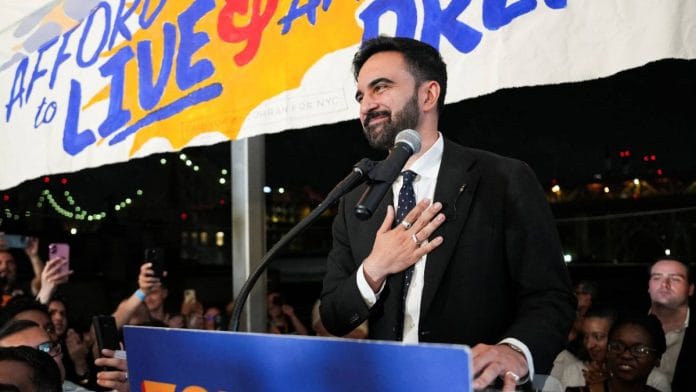Zohran Mamdani’s spectacular victory in New York is also a moment to look at how Indians have looked at him in the past few weeks.
Reactions from Indians can split the room in the middle. Indians usually aggressively embrace the success of Indian-origin members of the diaspora. But there was more than palpable hesitancy for Mamdani. He wasn’t the perfect postcard for new India.
In an open letter dated 10 October, a coalition of Indian-American and Hindu diaspora organisations in the US accused Mamdani, who is a bitter critic of Prime Minister Narendra Modi, of promoting “bigotry and bias” against Hindus. The letter said his words were “divisive, discriminatory and unbecoming of a leader seeking to lead such a diverse city”.
A lot of Indians also found his outright disdain for Modi and talk of the Indian Prime Minister’s involvement in the Gujarat riots in poor taste. His misinformed statements about there not being any Muslims left in Gujarat after the riots were well-circulated within Indian spheres.
Even Abhishek Manu Singhvi of the Congress had slammed Mamdani, tweeting, “When Zohran Mamdani opens his mouth, Pakistan’s PR team takes the day off. India doesn’t need enemies with ‘allies’ like him shouting fiction from New York”.
He was quickly mapped onto a popular Indian diaspora stereotype. That of the Indian/Indian Muslim who tries to curry favour in the West using his cultural passport to bad-mouth India for foreign political gain.
In an X post on 4 November, Rekha Sharma, BJP Rajya Sabha MP and former Chairperson of the National Commission for Women, supported Donald Trump’s negative views on a possible Mamdani win.
“For this one I am with Mr Trump. People of Indian origin when you vote think twice. An Indian mother doesn’t make Mr Mamdani a well-wisher of India,” she wrote.
A reminder
But then Zohran Mamdani is not a symbol of Indian-origin pride. He is a reminder of the political imaginations India once nurtured and then got tired of.
Indian media, meanwhile, is tracking how a “socialist outsider” and “Muslim” became New York’s mayor.
Earlier this year, Indian human rights activist Harsh Mander praised Zohran Mamdani, then a New York City mayoral candidate, and suggested that the Indian National Congress party could learn from his political stance.
Ramya, a Chennai-born strategy consultant based in Dubai, said: “Mamdani does not fit into the neat category of ‘Indian abroad makes it big’. He belongs to a far older, salt-air and spice-carrying world, the Indian Ocean world, the same cultural weather system that his mother Mira Nair captures in Monsoon Wedding and Mississippi Masala: Indian yet East African, global yet rooted, familiar yet in motion.’
The reactions of some in India show more curiosity than pride. Mamdani’s politics feel unusual compared to India’s current climate. He is anti-big capital while India celebrates capital. He foregrounds Muslim identity without apology, at a time when doing so in India invites scrutiny. He represents confident multiculturalism. He is a mirror many Indians, with their shrinking political space, don’t want to look into.
Congress leader Shashi Tharoor congratulated Mamdani and his mother Mira Nair on the victory. In an apolitical tweet styled for family and friends, he said “Wonderfully apt! Warmest congratulations to my old friend @MiraPagliNair on her son @ZohranKMamdani’s spectacular victory and to his uncles, my Stephanian friends Vicky and Gautam Nair, for their nephew’s triumph!”
The “wonderfully apt” though was in reference to Mamdani’s own winning speech where he quoted Nehru saying, “A moment comes, which comes but rarely in history, when we step out from the old to the new, when an age ends, and when the soul of a nation, long suppressed, finds utterance.”
Mamdani is India’s lost political vocabulary coming back through the diaspora: cooperative economics, secular belonging, diversity pride, working-class dignity, cultural confidence without chauvinism.
Johan Jose is a TPSJ alumnus currently interning with ThePrint.
(Edited by Aamaan Alam Khan)







Mayor Mamdani has no no complicated relationship with with Indians or Hindus. The complication is with the anti Muslim forces – the Hinduvtas. Let’s face facts that the Indians of America fall in the lot of Hinduvtas, buts long as they create no problems, the Mayor has nothing to fear. Indians are never firm about moral convictions. They change overnight
Mamdani is to New York what is Kejariwal is to Dehli…. His election shows that freebies are powerful vote getter whether it’s Dehli or New York…. Leftist are jumping at Mamdani election but his election has started the process of implosion of Democratic party.